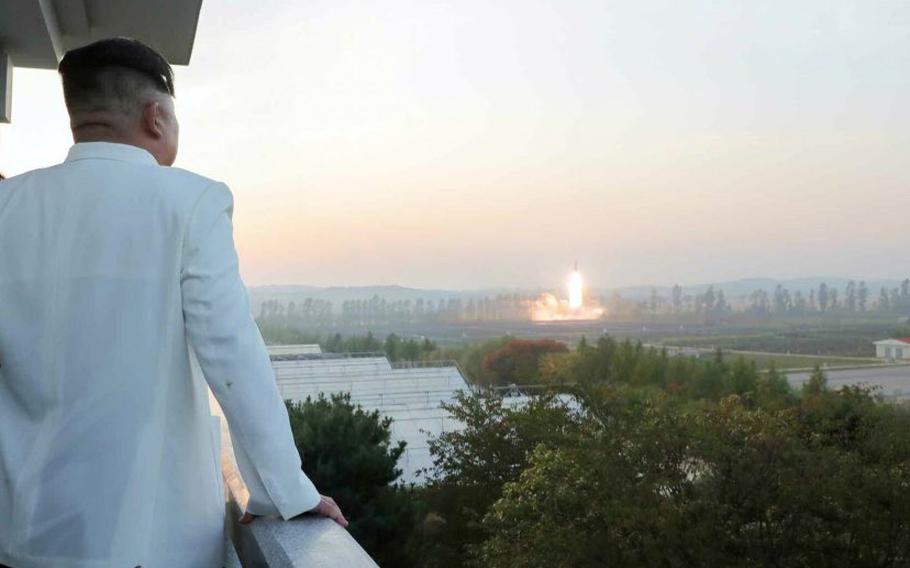
North Korean leader Kim Jong Un watches a missile launch in this image released by the state-run Korean Central News Agency on Oct. 10, 2022. (KCNA)
CAMP HUMPHREYS, South Korea — Positioning U.S. strategic assets in South Korea is preferable to deploying nuclear arms there to match the threat from North Korea, a senior defense official in Seoul said Thursday.
It is “most desirable” to deter the North using “U.S. strategic assets currently available on the Korean Peninsula,” rather than deploying U.S. tactical nuclear weapons, Vice Minister of National Defense Shin Beom Chul told SBS Radio on Thursday.
The United States has roughly 28,500 troops stationed in South Korea as well as a state-of-the-art Terminal High-Altitude Area Defense, or THAAD, system capable of intercepting ballistic missiles.
The defense ministry has primarily focused on the timely deployment of “strategic assets” in South Korea, rather than a “nuclear sharing” agreement with the U.S., Shin said.
His comments follow a call by the leader of the ruling People Power Party to scrap a 1991 inter-Korean denuclearization agreement that prohibits the South from possessing or producing nuclear weapons.
The agreement should be abolished if North Korea conducts its seventh nuclear test, Chung Jin-suk wrote Wednesday on his personal Facebook page.
“The moment of decision has come,” Chung said. The agreement has been turned into “scraps of toilet paper,” he added.
U.S. and South Korean officials have said North Korea, which has fired more than 40 missiles in 25 rounds of tests so far this year, is also prepared to test its first nuclear device since 2017.
The communist regime last fired two cruise missiles on Wednesday, according to North Korean state-run media and the South’s Ministry of National Defense. The North alarmed world leaders by launching a ballistic missile over Japan on Oct. 3.
A potential nuclear weapons program in South Korea would be at odds with existing U.S. policy. U.S. administrations under Presidents Joe Biden and Donald Trump have consistently stressed that the White House goal in the region is to rid the Korean Peninsula of nuclear weapons entirely.
“We will seek sustained diplomacy with North Korea to make tangible progress toward the complete denuclearization of the Korean Peninsula, while strengthening extended deterrence in the face of North Korean weapons of mass destruction and missile threats,” said Biden’s National Security Strategy released on Wednesday.
Former senior U.S. military officials have warned against deploying nuclear weapons in South Korea.
During a panel discussion hosted by The Korea Society in New York in November, former U.S. Forces Korea commander Robert Abrams said a South Korean nuclear weapons program is “unnecessary and it could potentially lead to misunderstanding and miscalculation by not just North Korea but other people in the region.”
“There’s been a lot of chatter lately about whether the Republic of Korea should develop its own nuclear weapons program — I’m not in favor of that,” Abrams said during the discussion, referring to South Korea. “I think that would be a bad idea. There’s a lot of unmentioned costs that go towards building a nuclear weapons program that I’m not sure has been well thought out.”